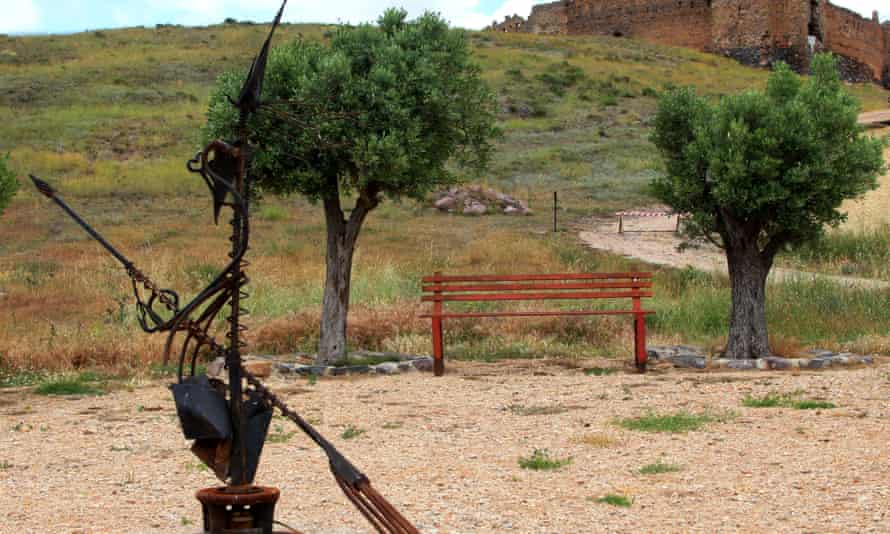Embracing its strange past is a blessing for Trasmoz as thousands flock to its witchcraft attractions

Ashifa Kassam in Madrid
@ashifa_k
Sun 22 Aug 2021 10.15 BST
Tucked into the foothills of northern Spain, the village of Trasmoz attracts thousands of tourists each year. For many, the allure is not its half-ruined castle nor stunning mountain backdrop but rather a curious quirk of history: Trasmoz is Spain’s only excommunicated and cursed village.
“So far, being excommunicated and cursed hasn’t been bad for us,” said Lola Ruiz Diaz, one of the 47 or so people who live all year round in Trasmoz, some 50 miles north-west of Zaragoza. “It’s turned out to be a point in our favour.”
Summers can see as many as 6,000 tourists descend on the village for its witchcraft festival in July, exploring its tiny sorcery museum and taking in reenactments of the curse being cast over the village. Few villagers ever expected Trasmoz’s singular status to become a tourist draw. But two decades ago, after locals began reclaiming the tales that had shifted and shaped Trasmoz over the years, a steady trickle of fascinated visitors began turning up.
Its unorthodox past goes back to a series of squabbles that began more than 700 years ago. At the time, Trasmoz was a prosperous community of Christians, Jews and Arabs with a powerful adversary: the neighbouring monastery of Veruela.
A quarrel between the two over whether villagers could fell trees in the area for firewood came to a head in 1252, leading the monastery’s abbot to demand that Trasmoz be excommunicated from the Catholic church. “One could call it a tantrum,” said Ruiz.

Advertisement
The second row came more than 250 years later, this time over access to the waterways that thread through the nearby Moncayo mountains. After the country’s nobles sided with Trasmoz, the monastery retaliated. With permission from the then Pope, Julius II, the abbot recited a curse from the Psalms on Trasmoz. To hear Ruiz tell it, villagers shrugged off the hex and life continued as normal. “In my view, the people of Trasmoz didn’t take very seriously all that the monastery launched against them, as they were used to it,” she said.
Some even sought to use the village’s status to their advantage. Decades after Trasmoz was excommunicated, the caretakers of the castle began covertly using the site to create false coins. In order to explain the hammering, banging and other noises emanating from the castle in the dead of night, they told people that witches haunted the area.
“The strange noises were them, of course, making false coins,” said Ruiz. “The monastery took advantage of it, telling people that Trasmoz was a witches’ village.”
The reputation stuck. Trasmoz became known as a village of sorcery, with deadly consequences at times. The last local to be accused of witchcraft was Joaquina Bona Sánchez, known as Tía Casca, who was thrown down a steep ravine in 1860 after being blamed for a spate of deaths in the village.
Over time, Trasmoz – whether for the curse or simply an echo of events playing out across Spain – fell into decline. The castle was abandoned and the estimated population of 700 began to dwindle after Spain ordered the expulsion of Jews in 1492 – followed by the Muslims – and, more recently, as urbanisation took hold.
The downward spiral halted, however, after local officials announced subsidies for villages to hold events aimed at celebrating their unique characteristics. One village honed in on its tradition of ceramics, another choose woodworking.
“We thought, what is Trasmoz known for?” said Ruiz. The answer was instantaneous. “Witches.”
So the annual Feria de Brujería – or witchcraft festival – was born, replete with tarot card readings, lotions made from local herbs and capped off with the crowning of one villager as the “witch” of the year. “It’s a way to recover the village’s link to witches, while also reclaiming the persecution that these women were subjected to,” said Ruiz.
It’s a lighthearted take on Trasmoz’s dark history, though some tourists take it more seriously. “People show up at my house asking me to get rid of the evil eye,” said Ruiz, who was named witch of the year in 2008. “But you’re not going to find that here.”

The festival has grown into one of the best attended in the northern region of Aragón, said Jesús Andia, the mayor of Trasmoz. “At the beginning, it was something symbolic for the village,” he said. “But soon we realised that people really like it.”
For the most part, residents of the village have been open to the idea of touting its longstanding feud with the church. “There are a few – very few – who take it personally and don’t like it,” said Andia. “But the rest of the municipality knows that these days, villages have to cling to something or they risk disappearing.”
Nearly eight centuries after Trasmoz was excommunicated, relations have been smoothed over with the Veruela monastery, with the two joining forces at times to organise cultural events And there’s little sign of the tempestuous relationship at Trasmoz’s church, where mass, baptisms and other rites are regularly held.
Even so, villagers have no interest in approaching the pope to see whether the excommunication or curse can be lifted. “We’re not considering it, we’re not going to do it,” said Andia. “Getting rid of it now would be like erasing everything – I think future generations would never forgive us.”









